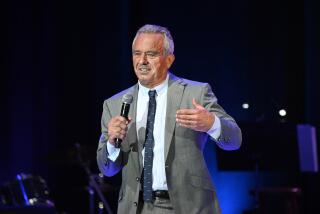VaxGen’s Stock Reels on Failure of AIDS Drug
- Share via
Shares in biotechnology company VaxGen Inc. plunged 47% on Monday after the company revealed that its five-year, $100-million trial of an experimental AIDS vaccine didn’t protect people from the virus.
The failure of the largest human trial yet for an AIDS vaccine throws VaxGen’s future in question. The company, based in Brisbane, Calif., has no licensed products and only about seven months of cash remaining.
John McCamant, editor of the Medical Technology Stock Letter in Berkeley, said the odds of VaxGen’s survival as an independent company “are very, very small.”
VaxGen’s management said Monday that its ability to tap investors for additional financing would depend largely on the results of a second, smaller AIDS vaccine trial that is winding up in Thailand. Results from that test are due later this year.
But investors Monday expressed impatience with VaxGen as the company’s shares hit a 52-week low during the day at $3 before closing at $6.86 a share, down $6.16, on Nasdaq. In recent weeks, as much as 60% of the company’s 14.5 million shares were controlled by short sellers, who were betting that the stock would fall.
Late Sunday, VaxGen confirmed that there was no meaningful difference in protection between the 3,300 participants who received its vaccine and the 1,700 patients who got a placebo in its much-anticipated test of the drug, AIDSVAX. Trial participants, mostly gay, white men in the United States, were chosen because they faced a risk of getting infected with the human immunodeficiency virus that causes AIDS.
“The disappointment comes from working in AIDS. This is no doubt a challenging little bug,” VaxGen President Donald P. Francis said Monday.
Many scientists, including Caltech President David Baltimore, a winner of the Nobel Prize in medicine, had predicted that the vaccine would not work because it was too simply designed to fend off the highly mutable HIV.
VaxGen’s management acknowledged that the vaccine was a high-risk project. But Francis, who decades ago was among the first to predict an AIDS epidemic when he worked at the national Centers for Disease Control and Prevention, said he would have been happy with a first-generation vaccine that worked 30% of the time. Vaccines against measles, pertussis and diphtheria are effective more than 90% of the time.
Still, VaxGen’s vaccine did not even meet Francis’ low expectations for it.
Though the overall trial failed, VaxGen said the data showed that HIV infection rates were lower among blacks and Asians. But VaxGen managers had no explanation for the difference, which outside experts dismissed as a statistical aberration.
Of the 5,400 people enrolled in the trial, 314 were black. A total of 13 blacks became infected with HIV, four of whom received the vaccine.
“These numbers are very small,” McCamant said. “We know the danger of data dredging.... It is very dangerous to draw conclusions.” He said another trial was needed to show whether the vaccine protects certain ethnic or racial groups. “But it is a high-risk venture,” he added. “I don’t think public investors will foot the bill.”
John P. Moore, an immunologist with New York Weill Cornell Medical Center, speculated that VaxGen provided figures on this small subgroup to offer investors “a silver lining in the dark cloud.” He could think of no biological basis to explain why the vaccine would behave differently across racial groups.
Francis said that at first he did not believe the data, either: “You do not usually have this kind of findings by race in a vaccine,” he said.
But it will take more time to tease out an explanation, if one exists, he said. When asked whether the results warranted further investment, Francis became angry and answered: “If society values this damn stuff, they better move it forward. We’ve proved that humans can be protected from HIV, even if it’s just four people.”
VaxGen was formed in 1995 as a spinoff of biotech giant Genentech Inc. Francis, 60, a former Genentech employee, co-founded VaxGen to further develop the AIDS vaccine technology developed by Genentech scientists.
Before joining Genentech, Francis caused a stir in the early days of the AIDS crisis at the CDC by demanding that the blood industry take steps to protect the nation’s blood supply. He later became a hero outside the medical world with the publication of a book on the early days of the crisis, “And the Band Played On,” which portrayed Francis as a bold crusader in the fight against the disease.
Besides its AIDS drug, VaxGen also is at work on vaccines for smallpox and anthrax. The U.S government is supporting development of those drugs, but there is no assurance that the efforts will result in a usable product.
More to Read
Inside the business of entertainment
The Wide Shot brings you news, analysis and insights on everything from streaming wars to production — and what it all means for the future.
You may occasionally receive promotional content from the Los Angeles Times.










